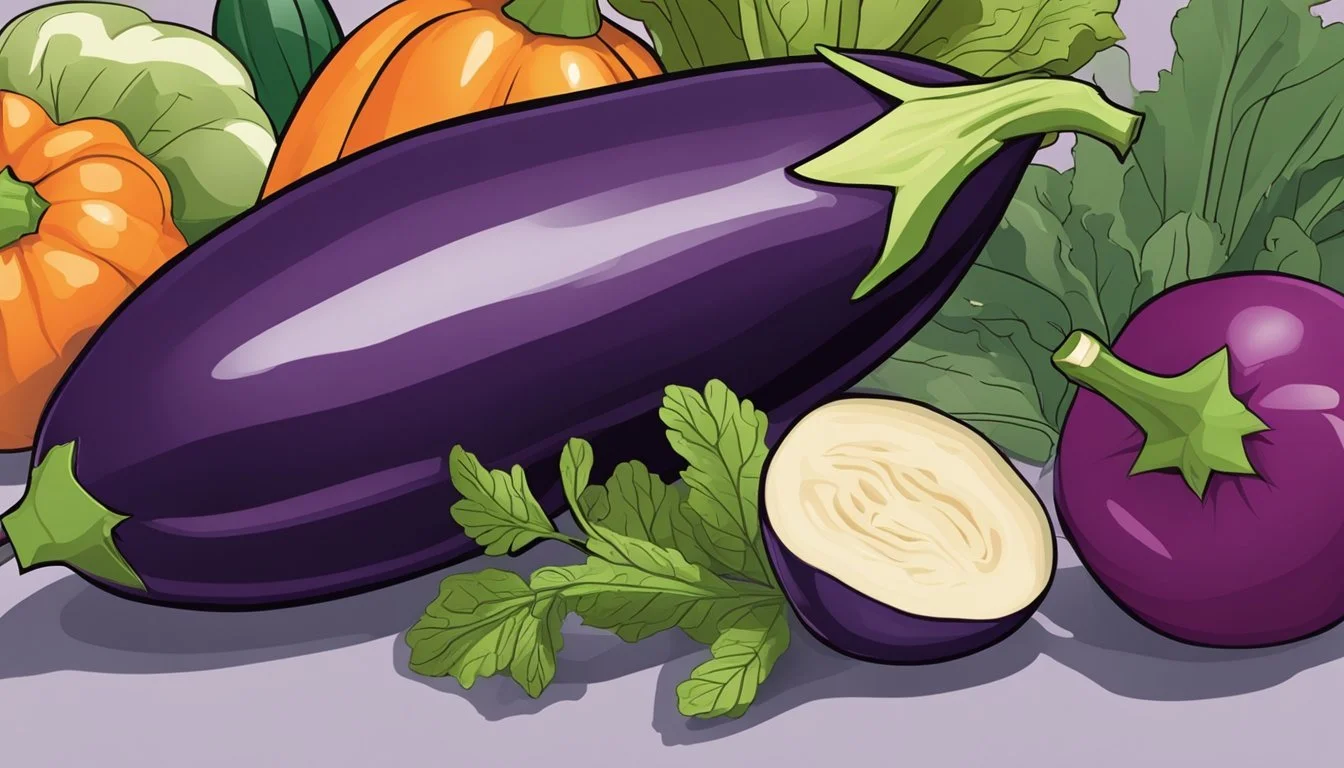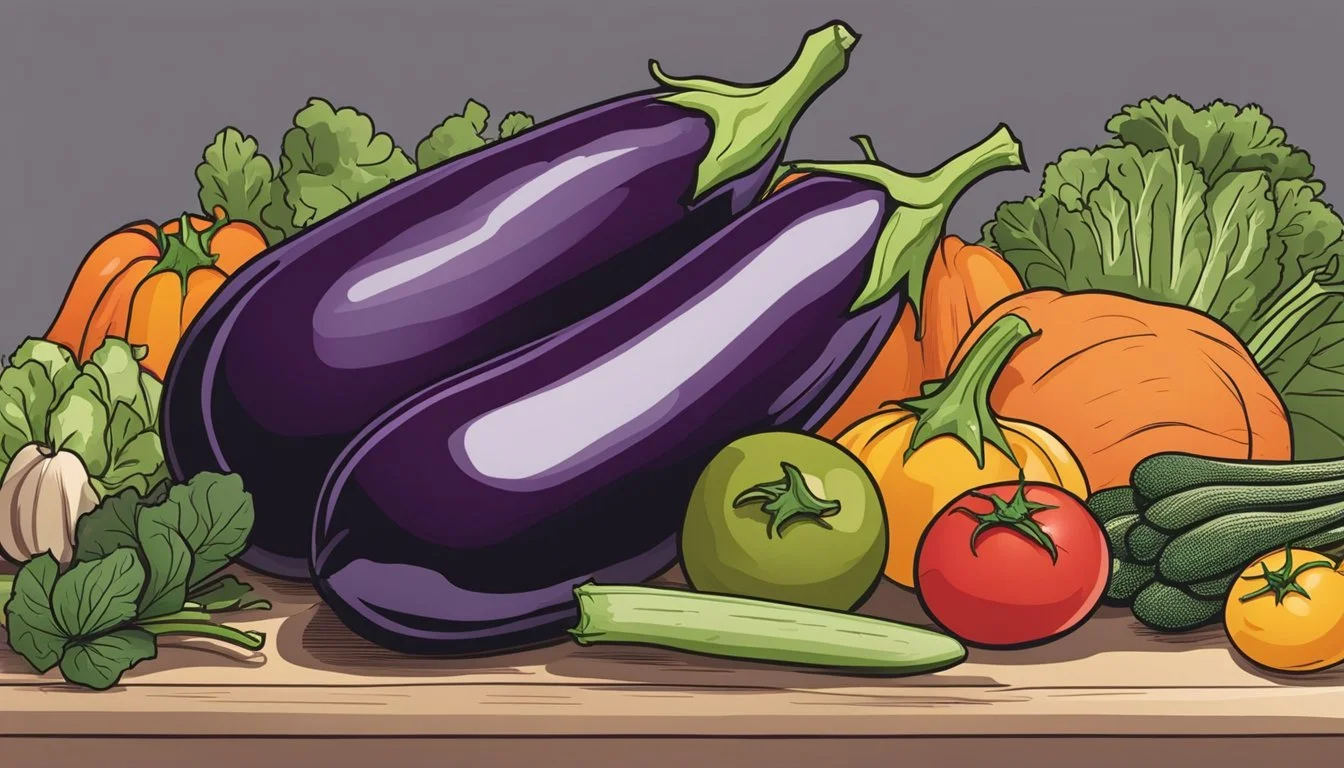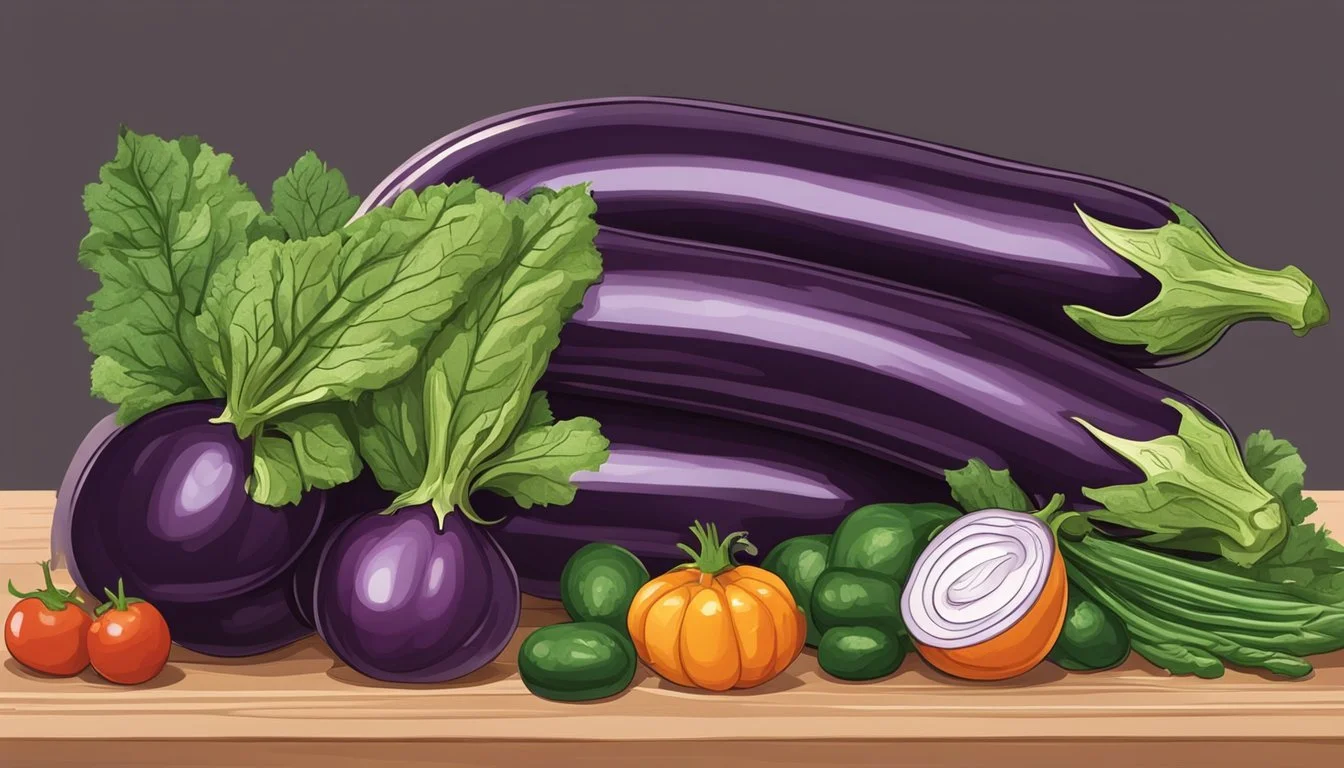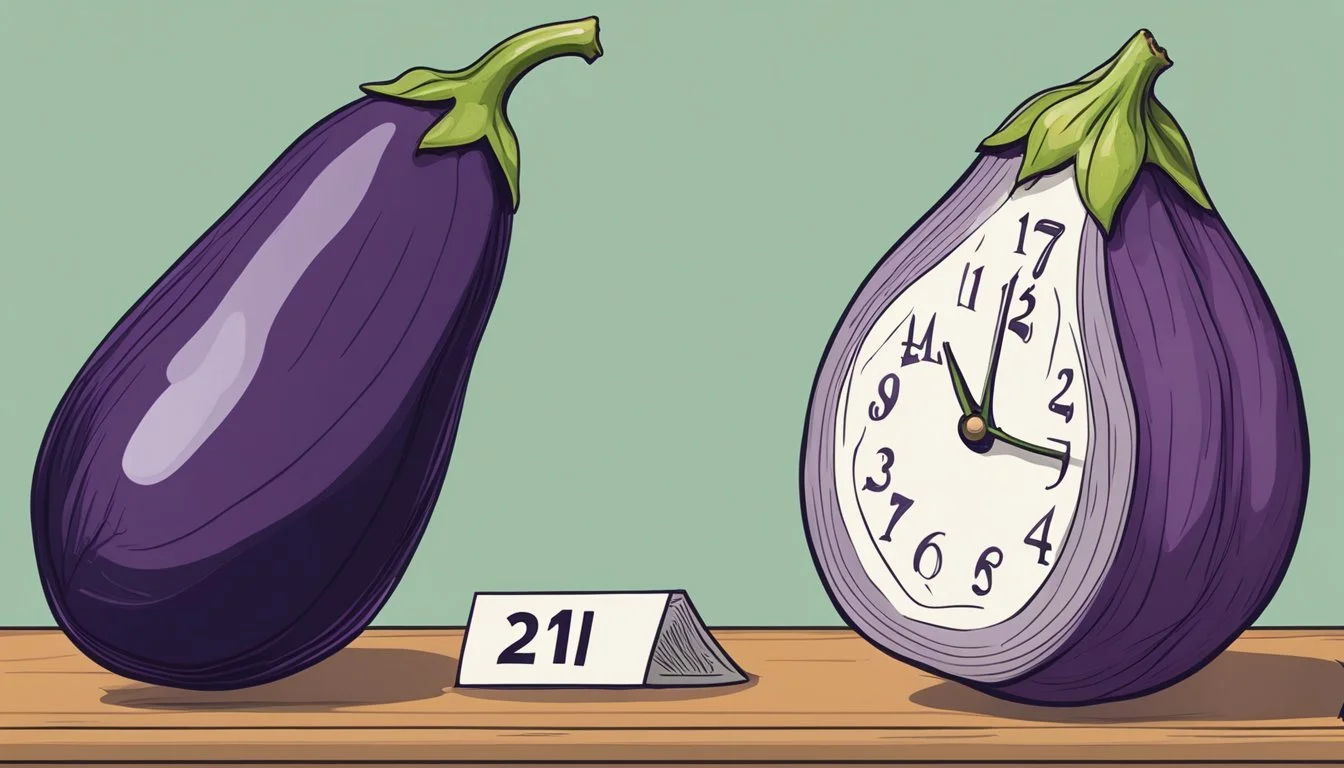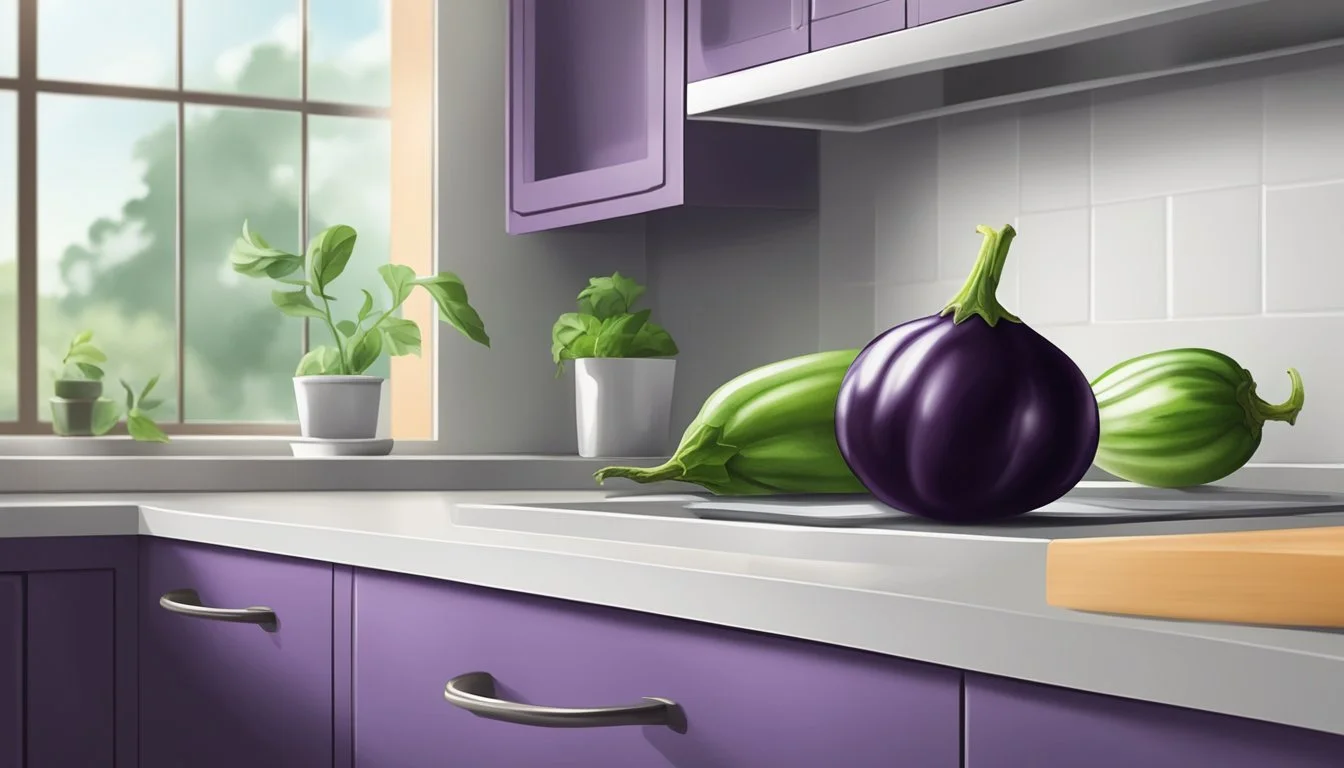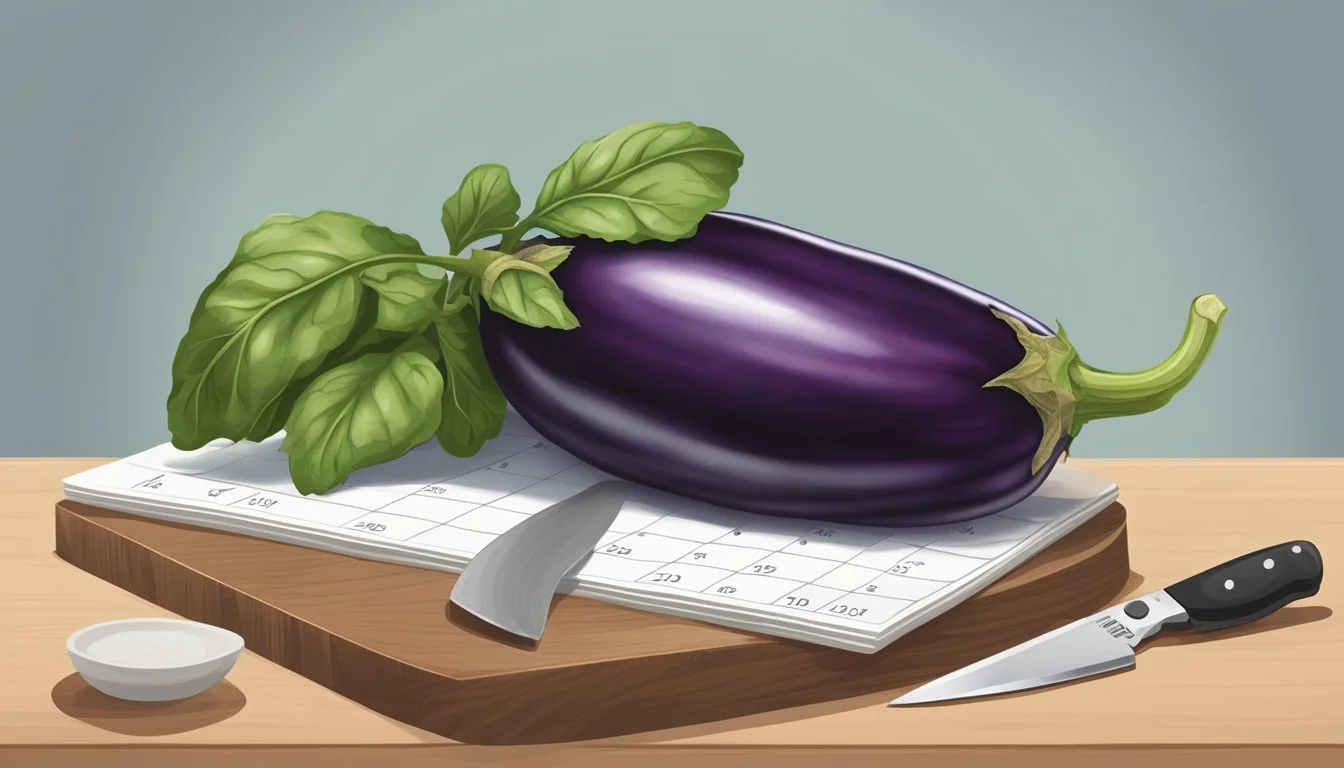How Long Does Eggplant Last?
Shelf Life and Storage Tips
Eggplant (What wine goes well with eggplant?), also known as aubergine, is a versatile vegetable commonly used in a variety of culinary dishes. Recognizing how long an eggplant (What wine goes well with eggplant?) lasts is important for maintaining its quality and texture. Typically, a fresh eggplant kept at room temperature will hold its top characteristics for three to five days. However, to prolong its freshness, storing it in a refrigerator at about 40° F will extend an eggplant's life for seven to ten days.
Quality retention does not only depend on the storage temperature but also on the eggplant's environment. For optimal storage, eggplants thrive in cool, dark places, ideally at temperatures around 50 degrees F, such as in a pantry or wine cooler. Separation from ethylene-producing fruits like melons, bananas (how long do bananas last?), and tomatoes is crucial, as this gas speeds up ripening, leading to a faster spoilage of sensitive vegetables like eggplant. If the eggplant is cut or cooked, it will last for about three to five days when refrigerated.
Determining the shelf life of an eggplant also involves assessing its ripeness. A ripe eggplant should be firm, with glossy skin free of discoloration or bruises. While spoilage signs are straightforward, including a wrinkled skin, soft spots, and an unpleasant odor, these indicators are essential for ensuring the consumption of the eggplant while it's at its best. In the realm of food storage, understanding these factors helps to maximize the usability of eggplants and prevent food waste.
Understanding Eggplants
Eggplants, also known as aubergines, belong to the nightshade family of plants and are revered for their unique, flavorful qualities and versatility in cooking. Characteristically firm to the touch when fresh, eggplants should have a glossy exterior and feel heavy for their size—a sign of their freshness and the quality of their texture.
Nutritional Composition:
Fiber: Eggplants are a good source of dietary fiber.
Seeds: Contain numerous small, soft edible seeds.
When selecting eggplants, consumers are advised to look for specimens with smooth and unblemished skins. A fresh eggplant should be firm but not hard; excessive softness can be a sign of decay. Internally, the seeds should be barely visible or should be small and soft if present, which will not detract from the eggplant's texture when cooked.
One aspect of eggplants is their propensity to have a bitter taste. This is often more pronounced in older or overripe eggplants. However, certain preparation methods, such as "sweating" the eggplant with salt, can help mitigate this bitterness and enhance the eggplant's innate flavor profile.
Eggplants are not just versatile in their culinary uses but also offer benefits due to their fiber content, which can aid digestion. Their flesh is spongy and absorbent, making them ideal for soaking up flavors in various dishes, contributing to their status as a beloved ingredient in cuisines around the world.
Storage Basics
Eggplant longevity can significantly benefit from proper storage techniques tailored to the environment available. It should be noted that eggplants are susceptible to chilling injury, so temperature control is essential. With that in mind, here are specific strategies for storing eggplants at room temperature, in the refrigerator, and in the freezer.
Room Temperature Storage
Eggplants thrive best in a cool, ventilated environment and should not be kept in close proximity to ethene-producing fruits such as apples or bananas which can accelerate spoilage. Ideally, they should rest in a ventilated bowl at room temperature, which is generally between 59℉ and 77℉. In this condition, an eggplant can last up to two days.
Refrigerator Storage
For longer storage, placing an eggplant in the fridge can extend its freshness for a few days. They should be stored whole and unwashed in the crisper drawer to avoid excess moisture which can lead to faster decay. If the eggplant is placed in a plastic bag, it should be perforated to allow airflow. Keep them away from the coldest parts of the refrigerator to prevent chilling injury.
Freezer Storage
For long-term preservation, an eggplant can be stored in the freezer. To prepare, one should cut the fruit into pieces, pat them dry, and freeze them initially on a lined baking sheet. Once frozen solid, one can transfer the pieces to an airtight container or a freezer-safe bag. This method will keep eggplant viable for up to a year, maintaining its quality for future use.
Signs of Good and Bad Eggplant
Determining the freshness of an eggplant is pivotal for both taste and safety. This section provides clear indicators to recognize both quality eggplants and those that have gone bad, focusing on appearance, texture, and signs of spoilage.
Characteristics of a Fresh Eggplant
A fresh eggplant will exhibit certain characteristics that one should look for when selecting the vegetable. These include:
Surface: The skin should be glossy and smooth without any cuts or bruises.
Color: A vibrant purple color, although some varieties may have different hues.
Firmness: The eggplant should feel firm and taut to the touch.
Stem and Cap: These parts should be bright green and not dried out.
Recognizing Spoilage in Eggplant
To tell if an eggplant has gone bad, consider the following signs:
Surface Wrinkling: When the skin gets wrinkled, it indicates the eggplant is dehydrating and losing its freshness.
Softness: A soft or spongy texture is a red flag. An overripe or spoiled eggplant may feel mushy.
Discoloration: Brown spots or areas of browning on the skin can be signs of decay.
Odor: Any foul or pungent smell suggests the eggplant has spoiled.
Stem and Cap: If the stem and cap appear dried out or moldy, the eggplant is likely not fresh.
Improving Eggplant Longevity
Storing eggplants properly can significantly extend their usable life. At room temperature, a ripe eggplant typically remains at its best for around three to five days. To enhance longevity, storage in a refrigerator at 40° F is recommended, where it can last for seven to ten days. However, for those who need to keep eggplants for an extended period, freezing is an excellent option.
Freezing Eggplants: To freeze eggplants, one should first cut them into slices and blanch them. Blanching involves boiling the slices for a few minutes and then plunging them into ice water. This process helps preserve color, texture, and nutritional value. After blanching, thoroughly drying the eggplant pieces before freezing will prevent ice crystals from forming.
Long-Term Storage: When storing in the freezer, using a freezer-safe bag is essential to prevent freezer burn. Eggplants can be stored in the freezer for up to eight months. It's important to label the bag with the date to keep track of how long they've been frozen.
Storing Eggplant Slices:
Cut into even slices or cubes
Blanch for 3-4 minutes
Cool in ice water immediately
Pat dry completely
Packaging for Freezer:
Place in freezer-safe bags
Squeeze out excess air
Label with the date
By following these steps, the shelf life of eggplants can be maximized, ensuring that they remain a flavorful and nutritious addition to meals for months to come.
Effects of Temperature and Ethylene
The longevity of eggplant is significantly influenced by temperature and exposure to ethylene gas. Eggplants thrive in cool, dark places with an optimum storage temperature of around 50°F. At room temperature, an eggplant typically lasts up to two days. However, when stored slightly cooler, away from ethylene-producing fruits and vegetables, its shelf life extends.
In terms of refrigeration, the colder environment of a fridge can be too chill for eggplants, often leading to the development of unappealing brown spots. The recommendation is to keep eggplants at approximately 50°F, but if refrigeration is necessary, it's best to store them for no longer than seven to ten days to maintain their quality.
Storage Location Temperature Expected Shelf Life Pantry Approximately 50°F A few weeks Fridge Around 40°F 5 to 7 days Freezer 0°F or below Up to 8 months
Furthermore, ethylene gas, a natural compound released by certain fruits and vegetables, can accelerate the ripening process of nearby produce. Ethylene-sensitive items like eggplant should be stored away from high ethylene producers such as bananas, melons, and tomatoes. This separation ensures a slower ripening process, thereby prolonging freshness and usability.
In the freezer, eggplant has a significantly longer shelf life. It can be stored properly for as long as eight months. Prior to freezing, slicing and pre-freezing on a baking sheet can prevent the pieces from sticking together, making it easier to use portion sizes as needed.
Preparing Eggplant for Storage
Proper preparation of eggplant before storage is essential to maintain its freshness. The process entails careful handling, cleaning, and deciding whether to store the eggplant whole or in pre-cut forms, which will influence its shelf-life and best cooking methods later on.
Handling and Cleaning
Before storing eggplant, one must handle it with care as it is a delicate fruit. The skin should be intact and free from punctures to prevent oxidation, which can lead to spoilage. To clean, gently wash the eggplant under cool running water and pat dry with a paper towel. Avoid soaking as excess moisture can accelerate decay.
Cutting and Pre-Cutting
When opting to store pre-cut eggplant, one should use a technique that minimizes exposure to air to prevent oxidation. Cutting should be done with a sharp knife to make clean cuts, which helps in preserving the quality of the eggplant. Here are two methods based on how one intends to cook the eggplant:
Baking: Slice the eggplant into even rounds or lengthwise, preparing it for dishes like eggplant parmesan (What wine goes well with eggplant parmesan?).
Frying: Cut the eggplant into cubes if they are to be fried or baked in smaller pieces; this technique is useful for dishes like caponata.
If one chooses to pre-cut the eggplant, it should be done right before cooking or freezing to retain its texture and flavor. Cooked eggplant should be stored only after it has cooled down to room temperature to prevent moisture buildup and spoilage.
Safety and Health Considerations
When considering the safety and health aspects of eggplant storage and consumption, it's essential to be aware of the indicators of spoilage and decay. Eggplants that show signs of softness, discoloration, or a slimy texture have likely begun to spoil and should not be consumed, as they may harbor unsafe levels of bacteria. Furthermore, the presence of an unusually bitter taste can also indicate spoilage.
The United States Department of Agriculture (USDA) recommends specific storage practices to prevent the rapid growth of bacteria. For instance, whole eggplants should be kept at a proper level of humidity in the refrigerator to prolong freshness. Typically, the cooler environment of a fridge can help eggplants last about 7-10 days.
When cut, eggplants are more prone to oxidation and may turn brown within 30 minutes if left exposed. To extend their shelf life, consumers should cook eggplants shortly after cutting them. Proper cooking of eggplant can also deactivate enzymes that contribute to spoilage.
In culinary dishes like ratatouille (What wine goes well with ratatouille?), where eggplant is a key ingredient, ensuring it is fresh and properly stored before preparation is crucial. To keep cut eggplant from browning and to potentially extend its use in cooked applications, it can be blanched—briefly cooked in boiling water—and then frozen for later use. Here is a suggested method for freezing:
Blanch sliced eggplants for 15 minutes at 350°F.
Pre-freeze the slices on a cookie sheet.
Transfer to freezer-safe bags, separating slices with wax paper to prevent sticking.
Following these steps, eggplant can be safely stored in the freezer for up to eight months, allowing for safe consumption well beyond its fresh shelf life.
Culinary Tips for Eggplant
Eggplants are versatile in the kitchen, useful in a range of dishes from frying to baking. However, their preparation is crucial to ensure a flavorful dish.
Preparation: Begin by slicing the eggplant as per your recipe's requirement. For a firmer texture, one can salt the slices and let them sit for about 30 minutes before cooking. This technique draws out moisture and reduces any bitterness.
Frying: To fry eggplant, start with a hot pan with enough oil to cover the surface. Eggplant absorbs oil quickly, so ensure to coat slices evenly for a crispy outcome. Fry until they are golden brown and tender.
Baking: When baking, preheat the oven to 350°F. Brush slices with oil to prevent sticking and bake until they're soft and slightly browned. This method is ideal for creating dishes like ratatouille where the eggplant's texture is key.
Freezing: For future use, cooked eggplant can be frozen by arranging pieces on a baking sheet and then transferring them to a freezer-safe bag once solid.
Eggplant enthusiasts will appreciate the simplicity of these methods and the delicious results. One's success with eggplant lies in these simple yet effective culinary practices.

